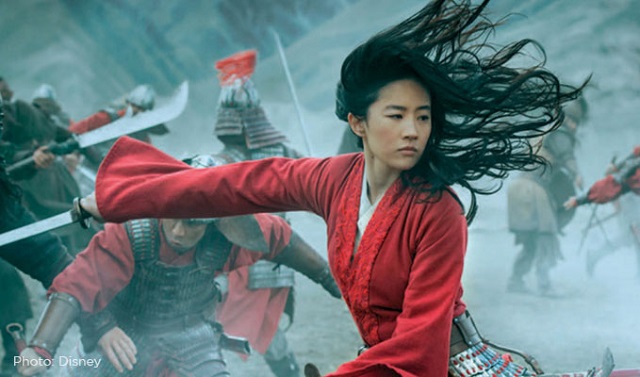Mulan Rouge: Disney Film Betrays a Shade of Red China

Coinciding with its long-anticipated release, Disney’s live-action remake of Mulan has become the source of mounting international controversy. Fans of Disney’s 1998 animated tale of a young Chinese woman who disguised herself as a man to fight the Huns in her ailing father’s place may find themselves disappointed in the way Disney created the film.
Parts of the movie were filmed in Xinjiang, the northwest region of China where the Chinese Communist Party (CCP) has launched an unparalleled campaign of suppression against Uyghur Muslims. Tucked away toward the end of the credits, Disney thanks eight Chinese government entities from Xinjiang. The region is now famous for its “re-education” camps where Uyghurs are detained without cause to be taught Party propaganda. Witnesses from the camps detail instances of torture, forced sterilization, and unsanitary living conditions.
Among the entities Disney is thankful for is a local branch of the regional Xinjiang public security bureau, which is directly involved in operating the camps. The entity is so clearly involved in human rights violations that the U.S. government issued Global Magnitsky sanctions against it, the hardest hitting sanctions that target human rights abusers. Disney also thanked local propaganda departments in Xinjiang.
The rise of China’s “re-education” camps from 2017-2018 occurred within the likely timeline Mulan would have been filmed. The world was waking up to the stark reality that internment camps were operating in the 21st century. Disney, as a company that often prides itself on being progressive, should have shown concern over filming in the vicinity of an international human rights crisis. China researcher Adrian Zenz called Disney “an international corporation profiteering in the shadow of concentration camps.”
But this isn’t the film’s first controversy. Hong Kong pro-democracy protestors first called for a boycott of the movie last year when lead actress Liu Yifei shared a social media post from a Chinese government-run newspaper that read: “I also support Hong Kong police. You can beat me up now.” At the time, hundreds of thousands of young pro-democracy protestors were taking to the streets and enduring brutal and violent crackdowns from the police.
Liu lives in the United States as a naturalized citizen and benefits immensely from its freedoms. Thus, protestors were justifiably angered when she showed no concern for the Hong Kongers desperate to maintain their freedoms in the face of the encroaching Chinese government, which fails to respect rule of law, freedom of speech, or religious freedom, among other basic rights.
But Hong Kong activists have their own recommendation for the “real Mulan.” They look to the soft-spoken 23-year-old Agnes Chow, a student leader of the pro-democracy movement. Chow was arrested for her activism earlier this summer under Hong Kong’s new national security law when she was accused of “colluding with foreign forces.”
A devoted Catholic, she points to her faith as a significant factor that motivates her advocacy, and that of other pro-democracy activists: “I do think that the religious belief and what we learn from our religion and the Bible gives us our belief and courage to fight for freedom and rights for Hong Kong people.” Chow is the perfect example of standing firm with grace and courage in an impossible situation. When looking for a real-life hero, Hong Kongers are right to celebrate Chow.
The very way Disney chose to go about making this movie is a betrayal of the story’s spirit. Mulan was defending China’s people against invaders. But through the creation of the movie, the creators of the film acquiesced to the Communist Party, which threatens the freedoms of others.
To many, the story of Mulan represents courage and sacrifice in defense of one’s family and country. It’s disappointing that in the process of telling this story, Disney chose to collaborate with one of the world’s worst violators of human rights — the Chinese Communist Party and the entities it controls. As long as Disney continues to choose profits over people, it will not bring honor to itself.
COLUMN BY
Arielle Del Turco
Assistant Director of the Center for Religious Liberty
Arielle Del Turco serves as Assistant Director of the Center for Religious Liberty at Family Research Council, where she is responsible for international religious freedom policy and advocacy efforts. Through research and analysis of international religious freedom matters, she helps craft effective policy solutions along with coordinating FRC’s advocacy on this issue. Arielle’s work has appeared in the USA Today, National Review, Jerusalem Post, Washington Examiner, CBN News, The Federalist, The National Interest, Christian Post, The American Conservative, Daily Signal, and Townhall. She has conducted a number of media interviews on international religious freedom, and has herself interviewed key advocates and victims of persecution. She holds a bachelor’s degree in Politics and History from Regent University, and is currently pursuing a master’s degree in International Relations.
EDITORS NOTE: This FRC-Action column is republished with permission. ©All rights reserved.
